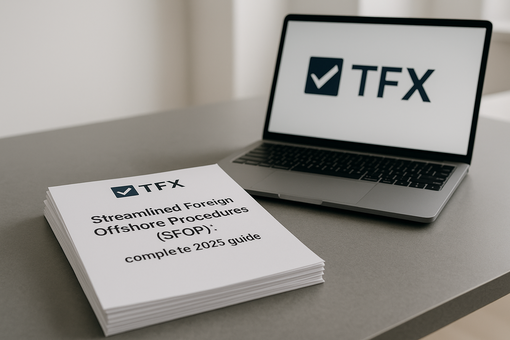How to file US taxes from the UK: A practical guide for American expats

If you’re a US citizen or green card holder living in the UK, you still have to file a US tax return each year. The IRS requires Americans abroad to report their worldwide income, even if they already pay taxes in the UK.
This can feel confusing at first: two tax systems, different filing deadlines, and unfamiliar forms. But the process is manageable once you know the steps. In this guide, we’ll walk through how US expats in the UK file their US taxes, what forms to expect, and how to stay compliant without paying more than you should..
This guide is by Taxes for Expats — a top-rated team helping Americans abroad meet US filing requirements. Learn more about our services or contact us.
Do Americans living in the UK have to file US taxes?
The US taxes its citizens and lawful permanent residents on worldwide income, wherever they live. This citizenship-based system applies even when UK tax is also due — here’s a breakdown of who must file.
-
US citizens must file a tax return when gross income meets the standard filing thresholds for their status and age.
-
Green card holders are US tax residents and must file and report worldwide income.
-
Dual citizens — if one nationality is US, you’re treated as a US citizen for tax purposes and must file when thresholds are met.
Common misunderstandings to avoid
Here are some quick misconceptions that trip up many expats, and the exact answer to those questions, so you won’t fall victim.
-
You shouldn’t report UK pensions and ISAs — UK pensions may get treaty relief but still require disclosure; ISAs aren’t US-tax-free, and UK funds can be PFICs, triggering Form 8621 plus FBAR/FATCA when thresholds apply.
-
Net Investment Income Tax — a 3.8% surtax on higher-earner investment income; FEIE doesn’t apply, and foreign tax credits generally don’t offset NIIT, so budget separately.
-
Self-employed income isn’t taxable by the US — the US–UK totalization agreement can prevent double social taxes; foreign entities may require forms like 8858/5471 and a certificate of coverage, but this doesn’t mean that your SE income is excluded.
-
Filing back taxes — non-willful taxpayers can often catch up via the Streamlined Filing Procedure with 3 years of returns and 6 years of FBARs, typically with reduced penalties.
US tax dates & filing for UK residents
If you plan to file a US tax return from the UK, the dates and forms below keep you compliant and penalty-free.
What are the US filing deadlines?
April 15 is the regular due date; Americans abroad get an automatic 2-month extension to June 15, with Form 4868 pushing filing to October 15 and a discretionary letter-request (separate from Form 4868) to December 15 in limited cases. Interest still accrues from April 15 on unpaid balances, so estimate and file extensions on time.

The IRS forms you need
Here are the must-have filings that apply to most Americans in the UK. Skipping any of these can trigger notices or penalties.
-
Form 1040 – your annual individual return reporting worldwide income.
-
FBAR (FinCEN 114) – required if the aggregate max of foreign accounts exceeds $10,000; due April 15 with an automatic extension to October 15.
-
FATCA – Form 8938 – living abroad thresholds: $200k/$300k single (end-of-year/any-time) and $400k/$600k MFJ. File it with your 1040.
These forms are the foundation — next comes getting the numbers right. Report all amounts in US dollars and keep the rate source in your workpapers; the IRS accepts any reasonable, consistently used rate and also publishes yearly averages. Save statements supporting balances and income so your filing ties cleanly to FBAR and FATCA disclosures.
US–UK tax years: align dates, avoid pain
Two fiscal clocks govern your life in Britain – one set by HMRC and one by the IRS. Understanding how they overlap is the key to a clean, penalty-free tax return. Here’s how the systems line up at a glance.
| Topic | UK tax year (HMRC) | US calendar year (IRS) |
|---|---|---|
| Reporting period | 6 Apr to 5 Apr the following year. | 1 Jan to 31 Dec. |
| Core filing deadline | Online Self Assessment due 31 Jan after the tax year; paper by 31 Oct. | Form 1040 due 15 Apr (next business day if weekend/holiday). |
| Automatic extension for expats | N/A | 2-month automatic to 15 Jun ((next business day if weekend/holiday)) if you live abroad; interest still runs from 15 Apr. Optional to 15 Oct via Form 4868. |
| Payment timing | Balancing payment by 31 Jan; Payments on Account on 31 Jan and 31 Jul when applicable. | Pay by 15 Apr to avoid interest/penalties; extension extends filing, not payment. |
| Who must file | Those HMRC requires (PAYE only workers often don’t file unless triggered) | US citizens and resident aliens report worldwide income each year, even when living in the UK. |
| Forms & portals | Self Assessment return via HMRC online; SA302 statements, P60/P45/P11D support. | Form 1040 e-file; attach forms as needed (1116/2555/8938, etc.). |
| Currency rules | Report in GBP to HMRC. | Report in USD; use spot or IRS yearly average where allowed. |
| Year-end mismatch impact | Income and tax may straddle two UK years. | Same pay period sits fully in the US year; align with credits/exclusions. |
Your goal is to map UK-dated pay and tax to the US calendar year without double-counting. Keep HMRC and IRS records side by side so your filing stays consistent, and you can report your income accurately across both systems. Below gives a brief breakdown
-
Anchor the periods – tag each payslip, P60/P45, and SA302 lines to the month earned, then place those amounts into the US Jan–Dec year before you file.
-
Match tax to income – when claiming the FTC, align UK income and UK tax paid/accrued to the same US year and category. (IRS practice units accept average rates for accrued foreign taxes.)
-
Respect payment rules – UK payments on account hit 31 Jan/31 Jul; US interest starts after 15 Apr, even if you use the June automatic extension. Plan cash flow accordingly.
-
Document everything – save HMRC calculations, payment confirmations, exchange-rate printouts, and your reconciliations to support the US tax return.
NOTE! If you moved mid-year or qualify for only part of the FEIE period, the exclusion is prorated by eligible days – don’t assume a full-year amount. Use IRS rules for physical presence/bona fide residence and keep a day-count log.
Also read. Tax guide for Americans in the UK
Reporting UK income on your US tax return – clear steps that work
American expats in the UK must translate their local income into US tax terms with precision. This is something you can’t avoid, so here’s a sharp, simple breakdown that ensures your filing meets IRS rules and avoids costly errors.
Step 1 – Report all global income on Form 1040. Include UK wages, self-employment income, bank interest, rental profits, and dividends on your US tax return, just as you would if earned in the States. The IRS requires all income, regardless of origin, to be reported annually by US citizens and green card holders.
Step 2 – Convert British pounds to US dollars accurately. Use the IRS’s annual average exchange rate for the tax year – 2024, which was approximately 1 GBP = 1.27 USD – unless you qualify to use spot rates for specific transactions. Keep your currency conversions consistent across the return to avoid mismatched reporting.
Step 3 – Use either the Foreign Earned Income Exclusion or Foreign Tax Credit. For 2025, you can exclude up to $130,000 of earned income with Form 2555 if you meet the bona fide residence or physical presence test. Alternatively, most UK-based earners benefit more from Form 1116, claiming a credit for UK income taxes already paid.
Step 4 – Complete all required reporting for foreign pensions and investments. File the FBAR (FinCEN Form 114) online through the BSA E-Filing system if your foreign accounts ever exceeded USD 10,000 in aggregate; also file Form 8938 (FATCA) if your assets breach the expat threshold of $200,000+ for singles or $400,000+ for joint filers. If your ISA or UK fund is classified as a PFIC, Form 8621 is required – these are highly scrutinized and carry complex tax consequences.
NOTE! Form 8938 does not relieve FBAR obligations.
Double tax – treaty & totalization guide
The US–UK income tax treaty allocates taxing rights, reduces double tax through credits or exemptions, and sets residency tie-breakers and pension rules. For earned income, the FEIE shields up to $130,000 in 2025 when you qualify under Form 2555.
The US–UK Social Security Totalization Agreement ensures you pay into only one system, using the detached-worker rule (generally up to 5 years) and a certificate of coverage. Together, these tools keep compliance smooth and are the backbone of filing US taxes from the UK without paying twice.
To make the most of these protections, expats should also consider how personal elections and relief choices shape their tax return.
-
Non-US spouse election – You can elect under IRC S. 6013(g)/(h) to treat a non-US spouse as a US resident and file a joint tax return; worldwide income becomes reportable, but it can unlock better bands/credits.
-
FEIE or FTC – Exclude up to $130,000 (2025) of earned income if you meet the tests or claim a dollar-for-dollar credit for qualified UK income taxes, with a 1-year carryback and a 10-year carryforward; model both methods before filing.
The US–UK treaty (Article 17) addresses pensions, but the US saving clause means US citizens typically still report UK pensions on the US return and rely on the FTC to relieve double tax.
Your methods for filing from overseas
Filing from abroad can be done in three main ways: through IRS Free File if your income qualifies, with reliable tax software that supports foreign addresses, or by mailing your tax return to the IRS either at Austin, TX 73301-0215 (no payment) or Charlotte, NC 28201-1303 (with payment). Each option has different pros and cons, especially if you have accounts, property, or income in the UK. Choosing the right route early helps you stay compliant and avoid last-minute stress.
Expert support for filing from the UK
Handling a cross-border tax return can feel overwhelming, but you don’t have to do it alone; we can take the burden off the US filings. Working with our support team means more than accurate paperwork — it’s peace of mind, especially when you need to file US taxes from the UK while balancing two tax systems.
Our specialists at Taxes for Expats are here to ensure you meet every IRS requirement with confidence and accuracy. With our easy-to-use automated tools and professional guidance, we take the stress out of your filings so you can stay fully compliant. Let us help you meet the requirements of tax compliance – and handle the details while you focus on life abroad.

FAQ
US citizens and green card holders must file and report worldwide income each year, even when also taxed by HMRC.
April 15 is standard, you get an automatic extension to June 15, and Form 4868 pushes filing to October 15 while interest still runs from April 15.
Model both; many UK-based filers benefit more from the FTC, while FEIE (up to $130,000 in 2025) applies if you meet the residence or physical-presence test.



